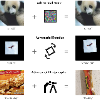Deep Neural Networks (DNN) are vulnerable to adversarial perturbations-small changes crafted deliberately on the input to mislead the model for wrong predictions. Adversarial attacks have disastrous consequences for deep learning-empowered critical applications. Existing defense and detection techniques both require extensive knowledge of the model, testing inputs, and even execution details. They are not viable for general deep learning implementations where the model internal is unknown, a common 'black-box' scenario for model users. Inspired by the fact that electromagnetic (EM) emanations of a model inference are dependent on both operations and data and may contain footprints of different input classes, we propose a framework, EMShepherd, to capture EM traces of model execution, perform processing on traces and exploit them for adversarial detection. Only benign samples and their EM traces are used to train the adversarial detector: a set of EM classifiers and class-specific unsupervised anomaly detectors. When the victim model system is under attack by an adversarial example, the model execution will be different from executions for the known classes, and the EM trace will be different. We demonstrate that our air-gapped EMShepherd can effectively detect different adversarial attacks on a commonly used FPGA deep learning accelerator for both Fashion MNIST and CIFAR-10 datasets. It achieves a 100% detection rate on most types of adversarial samples, which is comparable to the state-of-the-art 'white-box' software-based detectors.
翻译:深度神经网络(DNN)对对抗扰动非常脆弱 - 故意对输入做出小的变化来误导模型进行错误的预测。对抗攻击对于依赖于深度学习核心应用的后果是灾难性的。现有的防御和检测技术都需要广泛的模型知识、测试输入和执行细节。它们对于模型用户而言通常不可行,因为模型的内部是未知的,这是一个常见的“黑盒”场景。受到一种事实的启发,即模型推理的电磁(EM)发射取决于操作和数据,并可能包含不同输入类的痕迹,我们提出了一个框架EMShepherd,以捕捉模型执行的EM跟踪,对跟踪进行处理并利用它们来进行对抗检测。只使用良性样本及其EM跟踪来训练对抗检测器:EM分类器集和特定类别的无监督异常检测器。当模型系统受到针对对抗样本的攻击时,模型执行将与已知类的执行不同,EM跟踪也将不同。我们证明我们的空气隙式EMShepherd可以有效地检测Fashion MNIST和CIFAR-10数据集上常用的FPGA深度学习加速器上的不同对抗攻击。它在大多数类型的对抗样本上实现了100%的检测率,这与最先进的“白盒”软件检测器相当。


